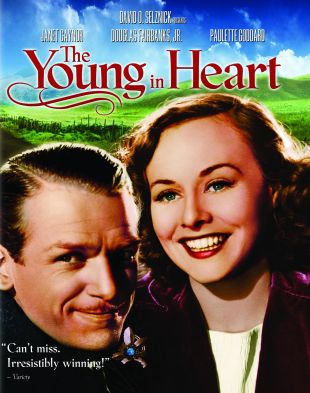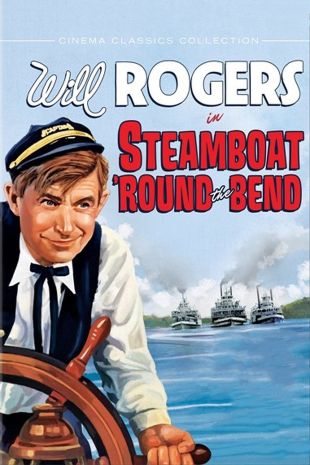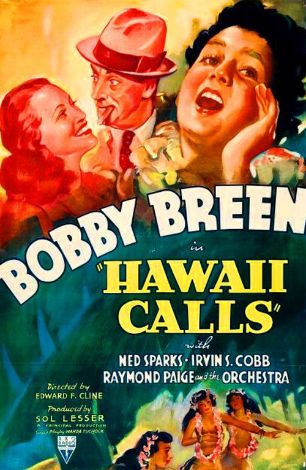Irvin S. Cobb was an author, journalist, and sometime actor whose greatest influence on film came through the adaptations of his work by director John Ford, who made two major adaptations of his work two decades apart. The second of four children, he was born Irvin Shrewsbury Cobb in Paducah, KY, in 1876; one ancestor, his grandfather Reuben Saunders (1808-1891), achieved fame as the physician who developed the hypodermic use of morphine-atropine as a treatment for cholera, as well as being the earliest known advocate of fresh air as a treatment for pneumonia and tuberculosis. Cobb was born in the year in which radical Reconstruction came to an end in the south, and he came of age in an era whose most pronounced characteristic was the imposition of Jim Crow laws and other manifestations of racial segregation restricting the rights of African American citizens. Many of the images and much of the content and sensibilities behind his writing were derived from childhood memories of Paducah and the surrounding area during the last decade of the nineteenth century, amid the slowly changing rural environment of his part of the south. It was Cobb's hope to pursue a career in law, but the death of his grandfather in 1892, and his father's subsequent descent into alcoholism, forced him to go to work full-time at age 16. His writing career began soon after, at the Paducah Daily News, when he was 17. Two years later, he was the newspaper's managing news editor, reportedly the youngest man ever to have held such a job on a daily newspaper. He later wrote for the Louisville Evening Post and then moved to New York City in 1904. Cobb coverage's of the Russian-Japanese peace conference in Portsmouth, NH, was picked up by newspapers all over the United States, transforming him into a leader in his profession and resulting in his being hired by the New York World under Joseph Pulitzer.
He also wrote numerous short stories, mostly about life in the south of the late nineteenth century. In his work, he depicted a world that was already starting to fade from view in the first two decades of the new century, populated by a cast of lovable eccentrics, colorful reprobates, upright and honorable civic leaders, and -- most controversially, in retrospect -- contented and deferential African Americans. Many of these tales were later collected in book form. The first of those, Old Judge Priest, was published in 1915; it later became common knowledge that the writer had based Judge Priest on a real-life local figure from Kentucky, Judge William Pitman Bishop. It was around this time that Cobb also made his first screen appearances. He was sufficiently well-known to play himself, alongside actress Billie Burke and financier and philanthropist Andrew Carnegie (also playing themselves), in John W. Noble's Our Mutual Girl (1914); and he portrayed an American tourist in the 1915 Cecil B. DeMille-directed drama The Arab. He was a rotund but attractive, even striking looking man -- and his appearance and fame made him easily caricatured -- and might have created something of a second career for himself as a screen actor; but his ventures into movies were interrupted by the onset of the First World War, which Cobb covered as a journalist for the Saturday Evening Post. He later published a book about the war entitled Paths of Glory.
By the end of the teens, he was again writing articles for numerous periodicals and was as famous as ever. Cobb's short stories began getting licensed for movie adaptations during the silent era, and he was both the star and subject of an experimental early sound short entitled Irvin S. Cobb All-American Storyteller, made in 1921. During this time he also became a screenwriter, composing the titles (which is to say, the dialogue up on the screen) for the comedies Peck's Bad Boy and Pardon My French (both 1921), among other films. His writing was still popular in the early '30s and became the source for such movies as The Woman Accused (1933), starring Cary Grant and Nancy Carroll. But the most impressive adaptations of his work came from director John Ford, who made two major films based on his work. The first, Judge Priest (1934), starred Will Rogers in the title role and included Cobb himself in a small part, and was made at Fox. It was a success at the time, but later fell out of distribution with the lapsing of its story rights. The second, The Sun Shines Bright, was done 19 years later through Ford's own production company by way of Republic Pictures, and it was a more elaborate film. The sources for the later movie were three specific stories, "The Sun Shines Bright," "The Mob from Massac," and "The Lord Provides," and the film cast Charles Winninger -- best remembered by audiences as Captain Andy in James Whale's Showboat (1936) -- as Judge Billy Priest. Although the movie was badly treated by Republic, which edited it without Ford's consent on its original release (though an uncut print was found decades later and issued on VHS tape), it was reportedly the director's personal favorite among all of his movies.
Cobb was no longer alive at the time of that movie's release, having passed away in 1944 at the age of 67 in New York City. And except for Ford's film, his stories didn't endure as attractive source material following his death. His benign vision of the rural south no longer seemed relevant or accessible amid the rising of the civil rights movement and the call for an end to segregation. Indeed, Ford's decision to accurately portray Cobb's vision made his 1953 movie very controversial in some circles, appearing as it did just a year before the U.S. Supreme Court's Brown v. Board of Education ruling, which began the gradual unraveling of at least some of the racial aspects of the social order that Cobb's work embodied. But he had been beloved of the Hollywood establishment in his time, standing in well enough to be chosen as the host of the 6th Academy Awards in 1935. One can hardly imagine any author aspiring to (or being given) such an honor in modern times. Cobb's daughter Patricia Cobb Harris was a published author in her own right, and in the 1950s, a decade after Cobb's death, his granddaughter, Patricia Chapman (aka, Buff Cobb), became a television personality and the second wife of then up-and-coming television journalist Mike Wallace. In addition to humorous stories of the old south, Cobb also wrote horror tales and was apparently an influence on H.P. Lovecraft. Cobb, in turn, enjoyed the admiration of Joel Chandler Harris, himself a major popular figure in southern popular culture.


